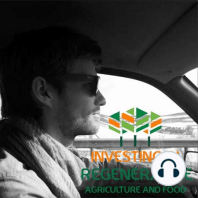58 min listen

65 Catherine Tubb, why precision fermentation completely disrupts industrial animal farming by 2030
65 Catherine Tubb, why precision fermentation completely disrupts industrial animal farming by 2030
ratings:
Length:
39 minutes
Released:
Dec 10, 2019
Format:
Podcast episode
Description
Will precision fermentation really be 100 times more land efficient, produce 10-25 times more feedstock and be 10 times more water efficient? And what does it do with nutrient density and healthcare? An interview with Catherine Tubb of RethinkX, co-author of the “Rethinking Food & Agriculture” report.----------------------------------------------------------Welcome to Investing in Regenerative Agriculture and Food.Join our Gumroad community, discover the tiers and benefits here: www.gumroad.com/investinginregenag. Other ways to support our work:- Share the podcast - Give a 5-star rating- Or buy us a coffee… or a meal! www.Ko-fi.com/regenerativeagriculture. ----------------------------------------------------------- Catherine's work focused primarily on disruption in the agriculture and food industries. She is the co-author, together with Tony Seba, of “Rethinking Food & Agriculture 2020-2030: The second domestication of plants and animals, the disruption of the cow and the collapse of the industrial livestock industry". The report shows how the modern food disruption, made possible by rapid advances in precision biology and an entirely new model of production, will have profound implications not just for the industrial agriculture industry, but for the wider economy, society, and the environment.This interview with Catherine might be uncomfortable for some in the regenerative food and ag space, who will struggle to call this real food. Regardless if this is happening as RethinkX claims, I think we need to pay attention to the developments, investment flows and potential impact on industrial animal farming (which would be great), farmers (not so great) and agriculture land (mixed prospects). I had and still have a lot of questions about nutrients, hormones and healthcare implications of these developments. But I also have them about industrial animal farming. So I invite you to listen to the interview, read the report and share your feedback!Show notes and all links can be found here:www.investinginregenerativeagriculture.com/2019/12/10/catherine-tubb. ----------------------------------------------------------- For feedback, ideas, suggestions please contact us through Twitter @KoenvanSeijen, or get in touch through the website www.investinginregenerativeagriculture.com. Join our newsletter on www.eepurl.com/cxU33P. The above references an opinion and is for information and educational purposes only. It is not intended to be investment advice. Seek a duly licensed professional for investment advice.https://groundswellag.com/2023-speakers/ https://groundswellag.com/2023-speakers/ Support the showFeedback, ideas, suggestions? - Twitter @KoenvanSeijen - Get in touch www.investinginregenerativeagriculture.comJoin our newsletter on www.eepurl.com/cxU33P! Support the showThanks for listening and sharing!
Released:
Dec 10, 2019
Format:
Podcast episode
Titles in the series (100)
07a Mike Korchinsky, protecting forests in Congo and Kenya with local communities by Investing in Regenerative Agriculture and Food